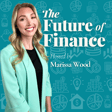
Finance Q&A: How much money would I need to never work again?
In this special Q&A episode of The Future of Finance Podcast, host and financial advisor Marissa Wood answers your most-asked personal finance questions — from how much car you can afford to the truth about Roth IRAs, student loans, and even that daily coffee habit ☕.
If you've ever wondered:
Should I max out my 401(k)?
How expensive of a car can I afford?
How much money would I need to NEVER work again?
This episode is for you.
These practical, real-world answers will help you take control of your money — whether you're just starting out, navigating student debt, or planning for a work-optional lifestyle.
💻 Work with Marissa: https://www.union-financial.com/
📩 Got a question for a future episode? Send it through our site!
⏱️ Timestamps
00:00 – Intro: Listener-submitted financial questions
00:52 – What is a Roth IRA & why should you invest in one?
02:15 – What a Roth IRA can actually hold
03:09 – How expensive of a car can I afford? (The 15% Rule) 🚗
04:58 – Why you should shop your car insurance every year
05:17 – Should I max out my 401(k)? Pros & cons
06:17 – Why liquidity matters when investing
07:17 – One of the biggest mistakes: cashing out your 401(k) early
08:50 – The compounding cost of taking out retirement funds
09:33 – Another big mistake: waiting too long to invest
10:01 – How much do you need to retire at 35 with 4 kids in NJ?
11:43 – Explaining the 4% withdrawal rule
12:05 – The bare minimum number: $1.8 million
13:03 – Best ways to invest when you’re young
14:03 – Why consistency is key 🧾
15:12 – Why you should keep investing when markets are down
16:44 – Tax-free investing vehicles for young people
17:18 – Should I aggressively pay off student loans? 🎓
18:09 – Student loans = good debt?
19:16 – Why investing instead of accelerating payments might win
20:00 – How do financial advisors get paid?
21:44 – Understanding fees vs. commissions
22:30 – Wrap-up & how to submit questions for future episodes
📌 Hashtags
#FinancePodcast #FinancialFreedom #RothIRA #401k #InvestingTips #StudentLoans #MoneyAdvice #QandA #PersonalFinance #FutureOfFinance #Budgeting #FinancialGoals #SmartSpending
